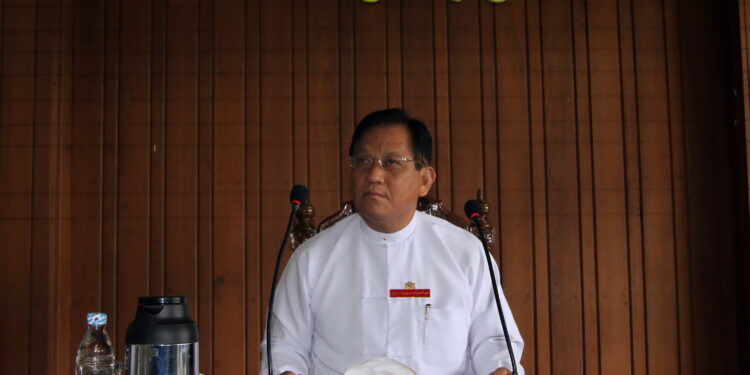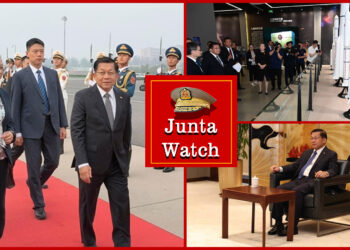Despite the rather whimsical cancellation of by-elections for 35 vacant parliamentary seats slated for later this year, an uneasy calm appears to have settled as electoral attention now turns to the run-up to the 2015 general elections. The first and foremost question is: Will elections transform Myanmar into a full-fledged democracy, or will it be an exercise in hogwash to entrench the current form of military indulgence in politics? We will surely get an answer once we get there, but for now it can be said without an iota of doubt that clouds of uncertainty loom large over the future of the elections—and democracy-building in Myanmar.
The fears are certainly not unfounded. Though many would like to think otherwise, the mere fact that a by-election has been canceled, and this too after so much talk of it being a “testing grounds” for 2015, is cause for concern.
Union Election Commission (UEC) Chairman Tin Aye cited two reasons in explaining the called-off poll: that with general elections slated for next year, it would be asking parties to finance and compete across the country in back-to-back elections, something many were unable to do; and second, even if one party swept all or a majority of the seats in the by-election, it would not affect the overall makeup of Parliament.
The grounds for canceling the by-election were flimsy and unconvincing, to say the least, given that the Union Election Commission (UEC) has conducted elections twice before, and those polls came under more challenging conditions to boot.
International groups have set up offices inside the UEC premises in Naypyidaw and continue to invest huge amounts of money to providing technical advice and support to the commission. Several other international elections-related groups continue to engage with the UEC and provide it exposure and expertise from time to time. In fact, the UEC is somewhat overwhelmed by the different international groups wanting to engage with it in one way or another. In 2010 and in the April 2012 by-elections, the UEC had none of these foreign “friends” and assistance, yet they managed to conduct the elections—however questionable those processes may have been.
So without mincing words, let us accept that UEC head Tin Aye thought he would get away with the reason he provided. Instead, the move has only raised more eyebrows and transformed doubts into a certain belief of his leanings and bias toward the ruling, military-backed Union Solidarity and Development Party (USDP).
There are stories making the rounds that Tin Aye’s decisions were more influenced by a high-level USDP committee, which had conveyed to him its decision not to participate in the by-election as it “wanted to prepare for 2015.” But let us also not forget that Tin Aye is a former lieutenant general and contested the 2010 elections on a USDP ticket, so why should he suddenly rise above party loyalty to play nonpartisan electoral God?
Questions have been raised on the legality of the UEC decision and there are talks of the UEC being unsure of what system to use, given parliamentary rumblings of a possible change of the electoral system for 2015. However, all this talk of “ifs” and “buts” would only make things more complex, and in the ensuing debate we could well be missing the forest for the trees.
Everyone knows the answer to why the by-elections were canceled. So let us then make an attempt to talk about the elephant in the room: the “USDP factor.” Would the USDP have won even one of the 35 seats if by-elections were held? Would by-elections have exposed the unpopularity of the party and how the shadow of its military past is not liked by the people? Would a loss in the by-elections have jeopardized its move to change the electoral system?
Very obvious questions and the answers are not too difficult to answer. The UEC, according to highly placed sources, has done its research, with surveys revealing that its popularity had dropped by a whopping 90 percent from what it was in 2010, even in its former bastions of political strength.
A recent tete-a-tete with some political parties revealed the angst and disappointment among most of the ethnic political parties. “Not only would the by-elections “expose the USDP’s failures, it would have provided an opportunity for the ethnic parties to voice their opinion and share concerns of their people inside the Parliament,” opined one Chin National Party MP, adding, “We have been denied that opportunity and cheated.”
He laces his views with a warning: “It is for other political parties to consider whether the chairman of the UEC can be trusted.”
But perhaps that’s not all. Shan National Democratic Party (SNDP) MPs feel the need for more ethnic MPs in Parliament to revive a deliberative culture in the legislature, which “used to happen before,” until after the 2012 by-elections. The ruling party is said to fear getting into any debate or discussions with the NLD, and so rules have been changed. A by-election could have made a difference for the ethnic parties to join forces and build pressure inside the Parliament for more discussions and responses from the government on proposed reform measures.
Thus to say that holding the by-elections would have been a “burden” is myopic, especially for a country like Myanmar, where the more the UEC and political parties are exposed to electoral processes the better.
Prakash is an elections expert working to promote electoral democracy and good governance in Southeast Asia.

















